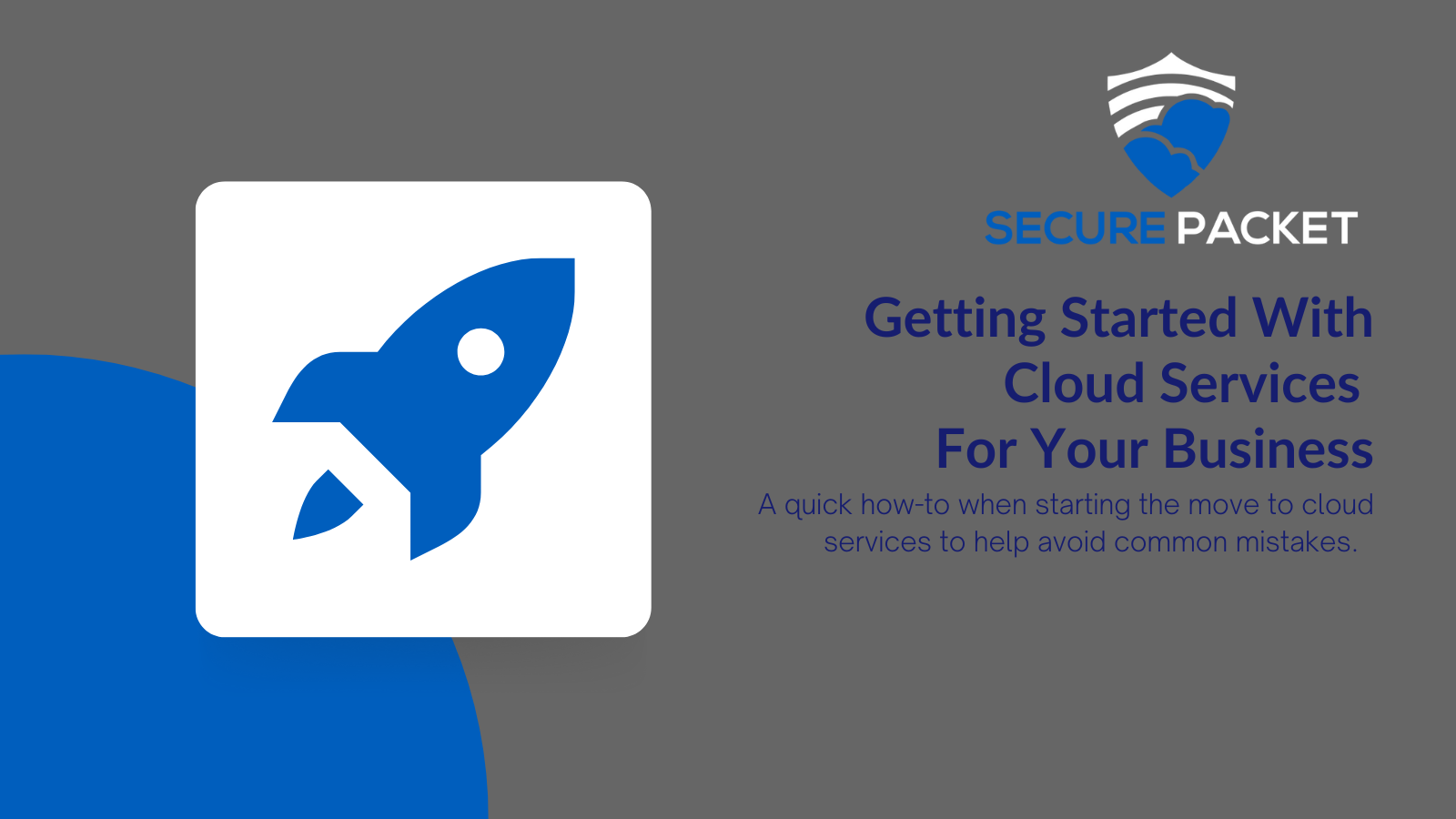
Getting started with business cloud services
When you are looking for cloud services for your business it can be difficult to distinguish what services you need, want, and wish to have from a cloud service provider. In today’s article, we will be going over the main areas to focus on for a small and medium business. We will be using some examples from companies in Orlando, Florida on what they thought they might need and once an evaluation was completed what they actually needed to ensure their businesses are protected, continue to grow, and IT is an asset and not a burden.
Gathering a list of issues before searching for business cloud services
First, before you approach a managed service provider (MSP) or a cloud services provider (CSP), you will need to document what issues you are facing as a company and what do you believe can be done to fix these issues. You don’t have to be technical in these explanations as the MSP or CSP should be able to take what you are looking for and translate that into services that will resolve your needs. This should involve all department leads so the list of needs, wants, and nice-to-haves can encompass your entire business even if the whole list won’t be resolved from the very beginning. Having a complete list from the beginning will allow your cloud service provider to provide a roadmap to where you want to get to with your cloud services.
One example that comes to mind is that remote workers and sales representatives were having issues with accessing on-premise servers and file shares when out in the field via VPN connections. The CEO wanted to stop the VPN connection drops, the erroring out of connections, and the slowness they were experiencing. From the service, the CEO believed it was the internet connection being overwhelmed and just the overall stability of the internet connection. This is a logical train of thought, however, it was flawed since it was just an assumption without any testing. This is where a service provider like Secure Packet can use their expertise to review the VPN appliance that was hosted on the firewall for any possible issues. It turns out that in the middle of the day when the firewall was getting hit with the most traffic was causing the majority of the issues. The backups were also configured to run in the middle of the business day instead of in the middle of the night when there was a minimal load. Since the firewall appliance was closing in on the end-of-life status (EoL) and would no longer be supported, the firewall was replaced and the backup schedule was configured to run after-hours. These two changes resolved the VPN issues and saved the business from upgrading their internet connection in error saving thousands of dollars while resolving the issues the first time. So documenting your issues is the best way to make sure they are evaluated correctly by your choice of a service provider.
Not all Cloud Service Providers fit all businesses
Your business is not the same as anyone else’s business even if they might be close in what services you provide. Your internal processes, employee base, and budgets will be different and sometimes significantly different. The biggest difference between SMB types will be the IT team and even sometimes the lack of a true IT team. In smaller businesses, the IT team can consist of the CEO/Owner and a front office manager. If this is your business then when comparing it to a mid-sized business with 3-5 IT team members will be drastically different on what type of CSP you are looking for. A small business with a lack of IT members will need to contract with a CSP or MSP that provides more hands-on for smaller issues like printers not working or a desktop not booting up. While the midsize business with internal IT team members will be able to resolve those lower level issues and they want to outsource the higher level IT tasks like firewalls, SIEM, IPS, offsite backups, disaster recovery, cloud servers, VPS, and other hosting and security related services.
Using your resources wisely is always the key to success in life and in business so your IT side of your business isn’t any different. Selecting the correct service providers and asking the right questions is key to having IT work for your and not being a burden.
Some great starting questions for a new vendor:
- What is your scope of support for service “x” I am contracting for?
- What is your service level agreement for service “x”?
- Do you provide hourly professional services if I need help outside of your scope of support?
- Are you willing to work with my other vendors directly to resolve issues outside of my scope of knowledge?
- What services would you add-on to my list of issues that I am not able to get from you?
- With my current budget, where do I fall short and what would you add on if I had another 50% of my budget available?
Asking these questions will provide you with an idea of what the provider offers and where they see you budget-wise and also how they see their current offering. It is much better to enter into a vendor relationship knowing all of the ins and outs of their offering so you are not surprised if there is something that you assumed to be there only then does it turn out that when you needed that feature or service it isn’t there and it has failed you and your team. If you are unsure about what questions to ask or even where to really start, selecting the right IT consultant is probably the best choice so you do not go into your Cloud journey wasting time and money by selecting the wrong service provider.

Shouldn’t I just go AWS or Azure?
Secure Packet offers non-hyper cloud services and consulting for AWS and Azure hyper-scale cloud services. So, from a Secure Packet point of view, it doesn’t matter to us. Secure Packet’s mission is to have clients be happy and satisfied with our services so they are happy to refer business while being long-term customers.
With that said, AWS or Azure is not always a great fit for everyone. Sure, you can deploy just about anything in the hyper-scale clouds nowadays, but there is usually more cost and complexity involved with most SMB-type deployments. Not every business requires three availability zones in the US, two in Europe, two in Asia, and one in Australia. If that is the case for your business then Secure Packet would probably spec out services that align with a hyper-scale cloud since the reach and services required will align with those offerings.
For most SMBs, you are either looking more regional or at least a US-based coverage with a very small amount coming from Canada and western Europe. If this is your case, then there would be more discussions around security, compliance, and any type of regulations you might face. Depending on your required guidance, managed service levels, and service technical levels, then Secure Packet would probably align you with another more niche type cloud provider that better fits your requirements while also lowering your overall costs. (Full disclosure: Secure Packet also offers cloud services depending on your overall requirements. If our internal services do not fit your needs, we will be open and honest and refer you to a partner provider that will be a better fit) Most of the niche partner providers we have partnered with provide a very strong set of services for a single or just a handful of industry niches. One for example most focuses on HIPAA compliance for the medical industry vendors who provide services to doctor offices, research companies, and medical research departments of universities. Their managed services can’t be touched by any of the offerings from AWS or Azure and to get up to par with their level of service you would have to contract another provider and sometimes multiple just to get to the same level of service.
How do I select the correct business cloud services?
We can use Secure Packet for example. If you were to come to us directly and wanted to explore cloud services for your business, you have the option to ask for both our internal cloud service options while also requesting Secure Packet to consult and obtain third-party quotes for comparison. As mentioned above, depending on your business’s unique needs, maybe there is a better fit than what we can offer. The only way to be sure is to do an IT strategy call. We suggest that if you choose not to use Secure Packet then you have at least 3 different vendors quote out your needs with a high preference on at least 5 if possible. There are just so many different options out there for MSP and CSP providers and no two are the same. Secure Packet, for example, is very unique as we are cloud agnostic and vendor agnostic as that is what our customers demand and how we got our start. Other service providers might only provide quotes for their services and will not provide any other consulting or strategy work.
If you do not have the IT staff on hand to formulate your IT needs, then there is always the option of breaking up the IT roadmap into different sections and hiring someone like Secure Packet as an IT consultant first. This way there is a clear separation of your IT consultant and then selecting the correct service provider separately and in a different state of your IT roadmap.
What type of business cloud services do I need?
Answering this question on which type of business cloud services you need is a very common one and without an IT strategy call and a review of issues and goals it is very hard to make a proper determination for your needs.
There are common types of services for most SMBs and even enterprises such as outsourcing your email to Microsoft M365 (formally O365) to help alleviate your team’s pain points with exchange servers and any downtime that has happened with them. Another common service to use in the cloud will be website server hosting. The larger your company gets, the more likely you will have all or at least most servers in the cloud and this includes your website’s presence. Having 100% uptime and enough bandwidth to serve up your website is critical for SEO, customer confidence, and other marketing-related tasks. As your business grows it makes sense to get your website off shared hosting or out of your office’s closet and into a true data center where you can have as close to 100% uptime as possible.
More and more companies are also turning to different cloud-based security products such as virtual firewall appliances, virtual intrusion prevention systems, and SIEM systems that can be in the cloud with your website and other servers you have chosen to move into the cloud.
Next steps in moving to business cloud services
Now that you have a basic understanding of what the path forward looks like, the next step is to start to engage cloud providers in your area. In Orlando, Florida, Secure Packet can help as we are servicing the United States with a heavy presence in the southeast region. Our headquarters is located in Orlando, Florida so you can have engineers and support employees come to your location if needed to provide the guidance you are looking for. Even if you are not sure how to phrase the issues you are facing, we can help! It is our specialty on taking technical speak and translating it to what the majority of the business world can understand.
Looking for some help and guidance as your continue on your business’s cloud journey? Secure Packet is here to help with engineers and support teams standing by. Schedule a free IT strategy call today to ensure your needs are covered. Secure Packet offers both Cloud Services and IT consulting if you or your team have a preference for a certain cloud platform.
